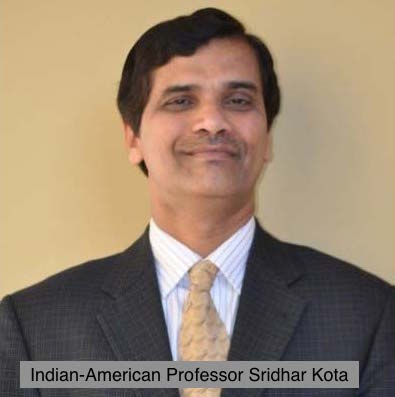
An Indian American engineering professor will lead an US consortium that will identify new technologies to enhance the country’s innovative ecosystem, manufacturing competitiveness and national security, the White House has announced.
Prof. Sridhar Kota, Herrick Professor of Engineering and director of the Institute for Manufacturing Leadership at the University of Michigan, will lead MForesight: The Alliance for Manufacturing Foresight, the White House said Oct. 2.
“In this ‘think-and-do’ tank, we will identify emerging technologies early on so the nation can invest public and private sector dollars in a way that builds the infrastructure, knowledge and workforce skills needed to anchor manufacturing technology in this country,” Mr Kota said.
Mr Kota served as assistant director for advanced manufacturing at the White House from 2009-2012. He helped create Obama’s Advanced Manufacturing Partnership in 2011 and the Manufacturing Innovation Institutes in 2012.
The US Commerce Department’s National Institute of Standards and Technology (NIST) and the National Science Foundation (NSF) said the consortium will commission teams of national subject matter experts to provide technology roadmaps and reports on selected emerging technologies that outline projections for development, application and economic impacts.
NSF and NIST are funding MForesight with a three-year, $5.8 million cooperative agreement.
“With collective access to over 30,000 subject matter experts across a wide range of industries, MForesight will serve as a continuous mechanism for research coordination across the public and private sectors,” Mr Kota said.
The group will examine a broad range of technologies. It could, for example, investigate how to cost-effectively improve quality control in drug-making in order to reduce shortages in certain cancer medications.
It could explore how best to manufacture emerging platform technologies such as flexible electronics, which have a wide variety of applications in places like consumer goods, defense and even health care.
Technologies will be evaluated based on economic impact, job growth, likelihood of co-investment by the private sector, impact on multiple industry sectors, and the likelihood of the U.S. gaining a first-mover advantage, among other criteria.
“Engineering and scientific advancements based on fundamental research have been the main drivers of U.S. economic growth over the past half century,” said France Cordova, director, National Science Foundation.
“Thanks to innovative technologies enabled by manufacturing research, production has grown at its fastest pace in more than a decade, creating significant economic value for the nation. To continue to reap these benefits, we must seek new research frontiers for manufacturing and pursue them for high-impact U.S. manufacturing innovation and economic competitiveness,” Cordova noted.





Be the first to comment